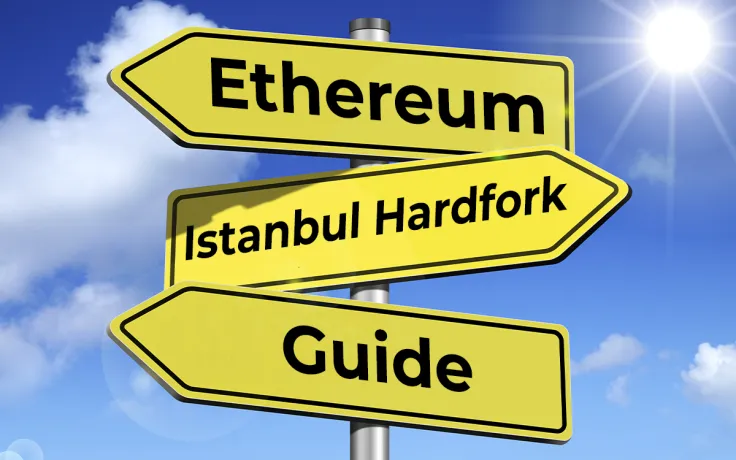
Every participant and observer of the Ethereum (ETH) network can hardly wait for the anticipated Istanbul Hard Fork. Maybe it is the right time to find out why we need Istanbul and what it will bring to the table.
Ethereum’s Istanbul in a Nutshell
Ethereum’s Istanbul is a hard fork in the Ethereum network. This means that new rules for network consensus (an “agreement” between computers on how the network exists and operates) will be implemented. The word “hard” means that this upgrade is not backwards compatible. In other words, the pre-Istanbul network will be terminated. If a network participant fails to meet the Istanbul requirements, then his/her computer will be unable to validate transactions and will therefore lose the ability to take part in Ethereum’s operations after the upgrade.
Ethereum’s Istanbul: When Will it Occur
Just like previous Ethereum hard forks, Istanbul has been postponed at least three times. While this hard fork has been discussed since the early days of Q2 2019, the initial date was set up for Summer 2019. However, due to issues with Parity, the second most popular implementation of the Ethereum client, the hard fork was delayed until October. On November 8th, the final moment came in the form of announcement - Block #9069000 is estimated to be mined on December 8th in the early hours. Therefore, the second Sunday of December will be the start of a new progressive epoch on the Ethereum network.
Ethereum Istanbul: What’s New
All novelties that are to be implemented by the Istanbul Hard Fork were initially presented as Ethereum Improvement Proposals (EIPs) by different Ethereum developers. The Istanbul upgrade will bring to life the following six EIPs:
EIP-152 allows for verification of the Equihash Proof-of-Work (PoW) algorithm within an Ethereum contract. In a nutshell, this is required for interoperability between Ethereum and ZCash.
EIP-1108 proposes Zero-Knowledge Succinct Non-Interactive Argument of Knowledge (zk-SNARKS), which are sophisticated cryptographic proofs used to build second-layer solutions above the Ethereum network. It will provide network scalability and reduce gas costs.
Two EIPs are about opcodes (instructions given to the Ethereum Virtual Machine executing smart contracts). This will allow the post-Istanbul Ethereum to improve its resistance to distributed denial-of-service (DDoS) attacks.
And finally, EIP-2028 and EIP-2200 will reduce some unnecessary gas costs for data utilized in a transaction.
Ethereum’s Istanbul: Pros and Cons
| PROS | CONS |
| Scalability: Istanbul will be more friendly for the solutions that take data off-chain | Uncertainty: Implementation of the hard fork to the testnet caused serious problems |
| Security: New security options such as zkSnarks will make the system attack-resistant | Conflicts: Numerous Istanbul settings are in contradiction to those scheduled for Ethereum 2.0 |
| Speed: Transactions will go faster | Diffusion of Focus: The switch to Ethereum 2.0 is more anticipated than any Ethereum 1.0 upgrade |
| Interoperability: Cross-chain interaction with zCash will be enabled | |
| Costs: Gas spending will be reduced |
Ethereum’s Istanbul: Expert Opinion
The experts are mostly positive about the prospects of the Istanbul Hard Fork. Some treat it as an inevitable step in Ethereum’s progress as this hard fork addresses scalability and developmental issues in a cutting-edge manner.
Yet, there is a group within the Ethereum community that criticize Istanbul as a burden to more overwhelming changes related to Ethereum 2.0. For instance, Dr. Aditya Das from Auckland University predicts software conflicts within the network:
Some of the proposed updates within Istanbul and Serenity overlap and conflict with each other, and Ethereum developers and stakeholders continue to aggressively debate the effectiveness of individual proposals within each update.
Ethereum’s Istanbul: Conclusion
In conclusion, Ethereum’s Istanbul Hard Fork is right around the corner. U.Today wishes all users a comfortable transition and would like to conclude with some of the basics:
-
Ethereum’s Istanbul is system-wide update of the Ethereum network. It is required for improving the speed and security of Ethereum, as well as interacting with other blockchains and building applications.
-
Ethereum’s Istanbul will occur on Block #9069000 on December 8, 2019.
-
Average holders of ETH should check the information from the services they use to store their coins. Most of them will be required to do nothing.
-
Node runners should upgrade their clients. U.Today wrote about this process.
-
Ethereum’s Istanbul opens the road to Ethereum 2.0. It is one of the last hard forks in the PoW-version of Ethereum.




 Vladislav Sopov
Vladislav Sopov Dan Burgin
Dan Burgin